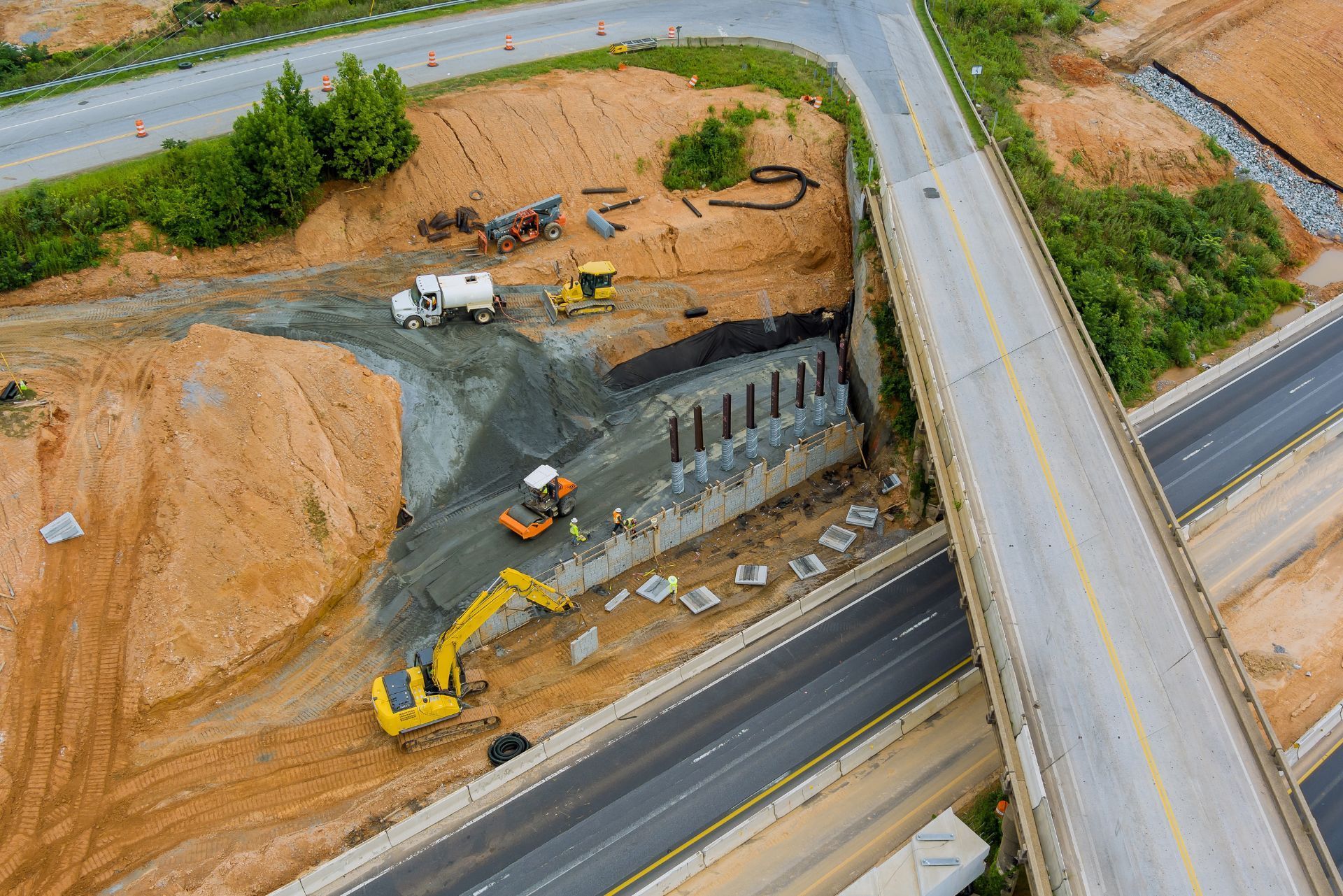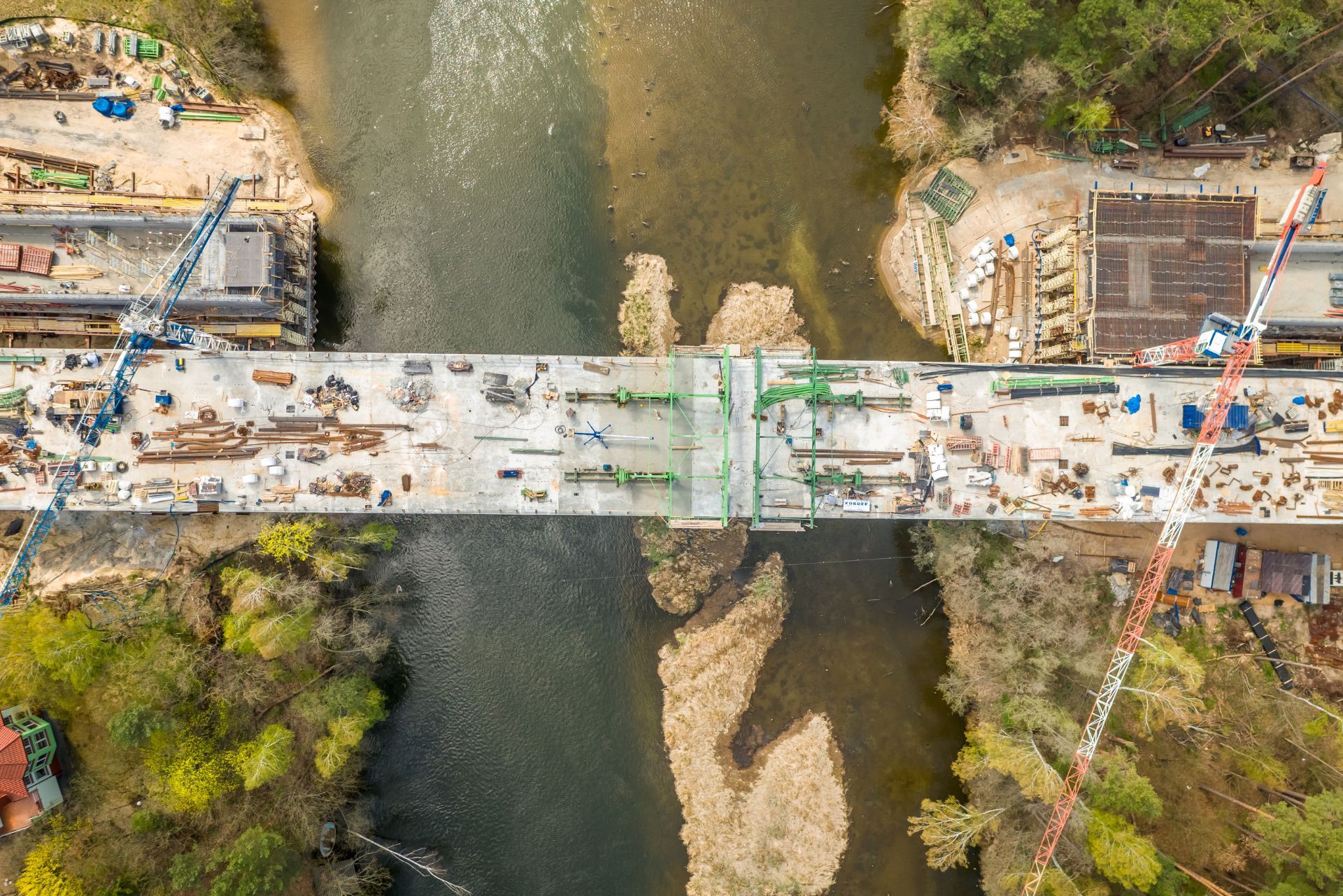South Carolina Bridge & Highway Contractor Insurance

9:00am - 5:00pm Mon-Fri
Will Reply in 15min*
Index
Contact Us
Phone
864-626-6181
service@southerninsured.com
Location
5 Century Drive Suite 130 Greenville, SC 29607
810 Dutch Square Boulevard, Suite 123 Columbia, SC 29210
When it comes to construction, especially in the realm of bridge and highway projects, the stakes are incredibly high. Not only do these projects require significant financial investment, but they also involve numerous risks ranging from accidents to environmental concerns. For contractors operating in South Carolina, understanding the nuances of contractor insurance is crucial. This article delves into the various aspects of bridge and highway contractor insurance, providing essential information to help contractors navigate this complex landscape.
Understanding Contractor Insurance
Contractor insurance is a broad term that encompasses various types of coverage designed to protect contractors from potential liabilities. For bridge and highway contractors, specific insurance policies are tailored to address the unique risks associated with these large-scale projects. Understanding the different types of insurance available is the first step in ensuring adequate protection.
Types of Contractor Insurance
There are several types of insurance that bridge and highway contractors should consider. Each policy serves a different purpose and can help mitigate various risks associated with construction projects.
- General Liability Insurance: This is the most fundamental type of insurance for contractors. It protects against claims of bodily injury, property damage, and personal injury that may occur during the course of a project.
- Workers' Compensation Insurance: This insurance is mandatory in South Carolina for businesses with four or more employees. It covers medical expenses and lost wages for workers injured on the job.
- Commercial Auto Insurance: Given the nature of construction work, contractors often use vehicles for transporting equipment and personnel. Commercial auto insurance protects against accidents involving these vehicles.
- Professional Liability Insurance: Also known as errors and omissions insurance, this policy protects contractors against claims of negligence or failure to deliver services as promised.
Importance of Insurance for Bridge and Highway Contractors
Insurance is not merely a legal requirement; it is a crucial component of any contractor's risk management strategy. For bridge and highway contractors, the importance of having comprehensive insurance coverage cannot be overstated.
Firstly, construction projects are inherently risky. Accidents can happen at any time, and without proper insurance, contractors could face substantial financial losses. Secondly, having insurance can enhance a contractor's credibility. Clients often prefer to work with insured contractors, as it demonstrates professionalism and a commitment to safety.
Moreover, the complexity of bridge and highway construction projects means that contractors must navigate a myriad of regulations and safety standards. Insurance not only provides financial protection but also ensures compliance with local and federal laws, which can vary significantly from one jurisdiction to another. This compliance is essential not just for the contractor's peace of mind, but also for maintaining good standing with regulatory bodies and avoiding costly fines.
In addition to the standard coverage options, contractors may also want to consider specialized policies such as pollution liability insurance, which is particularly relevant for projects that could impact the environment. This type of insurance protects contractors from claims related to pollution or environmental damage caused during construction activities. As public awareness of environmental issues grows, having such coverage can further enhance a contractor's reputation and appeal to clients who prioritize sustainability in their projects.

Regulatory Requirements in South Carolina
In South Carolina, contractors must adhere to specific regulatory requirements regarding insurance. Understanding these regulations is essential for compliance and to avoid potential legal issues.
State Regulations
The South Carolina Department of Labor, Licensing and Regulation (LLR) oversees the licensing and regulation of contractors in the state. Contractors must obtain a license to operate legally, and part of this process involves demonstrating adequate insurance coverage.
For bridge and highway contractors, the state may require additional coverage due to the nature of the work. This includes higher limits on liability insurance and specific endorsements that address the unique risks associated with heavy construction. Moreover, contractors engaged in projects involving public infrastructure must also be aware of federal regulations that may apply, particularly if federal funding is involved. These regulations can include compliance with the Federal Highway Administration (FHWA) standards, which emphasize safety and environmental considerations.
Licensing Requirements
To obtain a contractor's license in South Carolina, applicants must provide proof of insurance. This typically includes a certificate of insurance that outlines the types of coverage held and the policy limits. Additionally, contractors must maintain their insurance throughout the duration of their license to remain compliant.
Furthermore, the licensing process requires contractors to pass a written examination that tests their knowledge of construction laws, safety regulations, and best practices. This examination ensures that contractors are not only familiar with the regulatory landscape but also equipped to manage the risks associated with construction projects. Continuing education is also encouraged, as it helps contractors stay updated on any changes in regulations or industry standards, thereby enhancing their professional capabilities and ensuring the safety of their projects.
Choosing the Right Insurance Provider
Selecting the right insurance provider is a critical step in securing adequate coverage. Not all insurance companies offer the same level of service or understanding of the construction industry, so it's essential to do thorough research.
Factors to Consider
When choosing an insurance provider, contractors should consider several factors:
- Industry Experience: Look for an insurance company with experience in the construction industry, particularly with bridge and highway projects. They will be more familiar with the specific risks and coverage needs.
- Reputation: Research the provider's reputation. Online reviews and testimonials can provide insight into their customer service and claims handling process.
- Coverage Options: Ensure the provider offers a comprehensive range of coverage options tailored to the needs of bridge and highway contractors.
- Cost: While cost is an important consideration, it should not be the sole factor. Evaluate the value of coverage provided in relation to the premium cost.
Consulting with an Insurance Agent
Working with an experienced insurance agent can be immensely beneficial. An agent can help contractors navigate the complexities of insurance policies, ensuring they understand their coverage options and any exclusions that may apply. Additionally, an agent can assist in comparing quotes from multiple providers, helping contractors find the best coverage at the most competitive rates.
Moreover, an insurance agent can provide insights into emerging trends within the construction insurance market. For example, they may inform you about new coverage options that have been developed in response to recent changes in regulations or advancements in construction technology. This knowledge can be invaluable, as it allows contractors to stay ahead of potential risks and ensure they are adequately protected against unforeseen circumstances.
Furthermore, an agent can also offer guidance on risk management practices that can help lower insurance premiums. By implementing
safety protocols and training programs, contractors not only enhance workplace safety but may also qualify for discounts on their insurance policies. This proactive approach not only protects the business but also fosters a culture of safety among employees, ultimately leading to more successful project outcomes.
Common Exclusions in Contractor Insurance Policies
While contractor insurance provides essential coverage, it is important to be aware of common exclusions that may apply to policies. Understanding these exclusions can help contractors avoid unexpected liabilities. Many contractors may assume that their insurance will cover all potential risks, but without a clear understanding of these exclusions, they may find themselves financially vulnerable in the event of a claim.
General Exclusions
Most contractor insurance policies contain general exclusions that apply across all types of coverage. These may include:
- Intentional Acts: Insurance typically does not cover damages resulting from intentional acts or criminal activities. This means that if a contractor knowingly engages in harmful behavior or neglects safety protocols, any resulting claims will likely be denied.
- Wear and Tear: Routine maintenance and wear and tear are generally not covered, as these are considered part of normal operations. Contractors should budget for regular upkeep and repairs, as these costs will not be reimbursed by insurance.
- Contractual Liabilities: Any liabilities assumed under a contract that go beyond normal operations may not be covered. Contractors should carefully review their contracts to identify any additional risks they may be taking on that could lead to uncovered liabilities.
Project-Specific Exclusions
In addition to general exclusions, bridge and highway contractors may encounter project-specific exclusions. These can include:
- Environmental Damage: Policies may exclude coverage for damages related to environmental contamination or pollution unless specifically included. This is particularly relevant for contractors working on projects near sensitive ecosystems, where even minor incidents can lead to significant liabilities.
- Design Flaws: If a contractor is responsible for design work, claims related to design flaws may not be covered under general liability policies. This exclusion emphasizes the importance of having a clear delineation of responsibilities and ensuring that adequate design errors and omissions insurance is in place.
Furthermore, contractors should be aware of exclusions related to specific types of work or materials used. For instance, certain high-risk activities, such as demolition or excavation, may have additional exclusions that could impact coverage. Additionally, the use of unapproved or substandard materials can lead to claims being denied, as insurers often require compliance with industry standards. By understanding these nuances, contractors can better navigate the complexities of their insurance policies and ensure they are adequately protected against potential risks.

Claims Process for Contractor Insurance
Understanding the claims process is vital for contractors to ensure they can access their insurance benefits when needed. The process can vary depending on the provider, but there are common steps that most contractors will encounter.
Steps to File a Claim
Filing a claim typically involves the following steps:
- Notify the Insurance Provider: As soon as an incident occurs, the contractor should notify their insurance provider. Most companies have a specific timeframe within which claims must be reported.
- Document the Incident: Collect all relevant documentation related to the incident, including photographs, witness statements, and incident reports. This information will be crucial for the claims adjuster.
- Complete Claim Forms: The insurance provider will require specific forms to be filled out. Ensure all information is accurate and complete to avoid delays.
- Follow Up: After submitting the claim, follow up with the insurance provider to check on the status and provide any additional information they may require.
Working with Claims Adjusters
Claims adjusters play a critical role in the claims process. They are responsible for investigating the claim, assessing damages, and determining the payout amount. Contractors should be prepared to cooperate fully with adjusters, providing any requested information promptly.
It is also advisable to maintain clear and open communication with the adjuster throughout the process. This can help facilitate a smoother claims experience and ensure that all parties are on the same page. Additionally, contractors should be aware that adjusters may conduct site visits to inspect the damage firsthand. Being present during these visits can allow contractors to explain the context of the incident, which can be beneficial for the claims assessment.
Moreover, understanding the adjuster's perspective can empower contractors to advocate for their needs effectively. Adjusters often have a wealth of experience and can provide insights into what documentation or evidence may strengthen a claim. Engaging in a constructive dialogue can not only expedite the process but also build a rapport that may be advantageous if future claims arise. By fostering a collaborative relationship with the adjuster, contractors can navigate the complexities of the claims process with greater confidence and clarity.
Risk Management Strategies for Contractors
Implementing effective risk management strategies can significantly reduce the likelihood of claims and enhance overall safety on job sites. For bridge and highway contractors, proactive measures are essential.
Safety Training and Protocols
Investing in safety training for all employees is one of the most effective ways to minimize accidents and injuries on the job site. Regular training sessions should cover equipment operation, hazard recognition, and emergency response procedures.
Additionally, establishing clear safety protocols can help ensure that all workers understand their responsibilities and the importance of adhering to safety measures. This not only protects employees but also reduces the risk of costly insurance claims. Furthermore, incorporating hands-on training and simulations can enhance retention of safety practices, allowing workers to experience real-life scenarios in a controlled environment. This practical approach not only boosts confidence but also fosters a culture of safety where employees feel empowered to speak up about potential hazards.
Regular Equipment Maintenance
Proper maintenance of equipment is crucial in preventing accidents and ensuring operational efficiency. Contractors should implement a regular maintenance schedule for all machinery and vehicles used on job sites. This includes routine inspections, servicing, and repairs as needed.
By maintaining equipment in good working order, contractors can reduce the risk of mechanical failures that could lead to accidents or injuries. Additionally, keeping detailed records of maintenance activities can provide valuable insights into equipment performance and longevity. This proactive approach not only helps in budgeting for repairs and replacements but also demonstrates due diligence in safety practices, which can be beneficial during audits or insurance evaluations. Furthermore, investing in newer technologies, such as predictive maintenance tools, can help identify potential issues before they become critical, further enhancing safety and efficiency on the job site.
Conclusion
In the world of bridge and highway construction, contractor insurance is an indispensable tool for managing risk and ensuring business continuity. Understanding the types of coverage available, regulatory requirements, and the claims process can empower contractors to make informed decisions about their insurance needs.
By choosing the right insurance provider and implementing effective risk management strategies, contractors can protect themselves from potential liabilities and focus on delivering high-quality projects. In South Carolina, where construction projects play a vital role in infrastructure development, having the right insurance coverage is not just a legal obligation; it is a cornerstone of successful and sustainable business practices.







